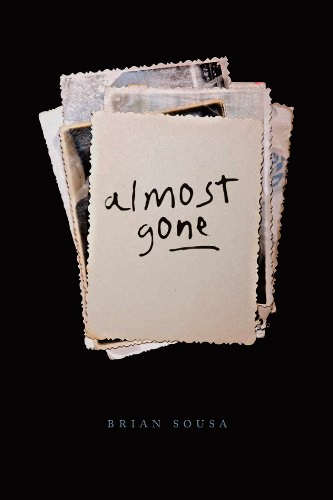Verdad Magazine Volume 14
Spring 2013, Volume 14
Almost Gone—an important debut novel from a leading member of a new generation of Portuguese-American writers—is a tough, many-layered story that arises from the tough, many-layered lives of its characters, moving forward and backward in staccato grace between generations and their deeper drives and anxieties. Brian Sousa’s technique is apt in his approach to the weaving of this novel, for something of this scope could swell and curve like the complicated masterworks of Balzac or Trollope or Eça de Queirós, but we live in a different age, and in Almost Gone, time is fragmented as we experience it, and we come to know the characters not in the unbroken arc of classic development but in fragments of story, each piece adding and connecting until a tremulous whole begins to emerge, and we experience a circle of fated persons living in their presents and alive also in their pasts, spanning the Lusophone globe from Portugal to Rhode Island to Brazil. It is a circle that will implode upon itself, of course, and this is Sousa’s design. At the novel’s center is Scott, a third-generation Portuguese American. There is something Biblical in the way Scott seemingly inherits a darkness from the generations before him, such as from his grandfather Nuno, who came to America, as so many immigrants have, hauling a heavy cordage of secrets and conflicts along with him, and as we touch the lives of others in the Portuguese Community—and in far-flung settings in Europe and South-America, too—we gain a sense of the connections, sometimes deep and sometimes tenuous—between the young Scott, his father, his grandfather and grandmother, fathers, wives and children, and a somewhat mysterious and alluring neighbor. We are, in the course of the novel, given privilege to the interlocking difficulties of a family that might seem, if we knew them but slightly, well-assimilated into American mainstream culture. But Sousa does not treat them casually, nor does he fall into the trap of a clichéd immigrant rags-to-riches narrative (though Nuno and his extended family clearly have achieved the comforts of the solid working class). What Sousa does is to allow the reader to experience their darker moments and their particular struggles, and we feel in each of them the urge to find some sort of solace and sense in a world of challenges that they are not always equal to.
It would do disservice to the book to speak in more particulars than I have here, for Almost Gone offers its shares of revelations and surprises. Suffice it to say that Sousa shrinks from nothing, and that his characters will be sometimes shocking and yet sometimes strangely familiar. What lies buried in the hearts here and what will out is the engine driving all these pieces. Part of the gravity of the book emanates from the way the chapters early on resemble discrete stories, arcing seemingly unto themselves—but then they begin deftly and inexorably crossing and melding into a rich and richly unsettling surface that takes the attentive reader deeply not only into the Portuguese-American experience but also into the unique darknesses and driving hopes of a clutch of human hearts. Almost Gone is a book for all Portuguese and Portuguese-American readers—one might say a necessary book, for it affirms the presence of a segment of Portuguese-American life so far ignored—but it is also a book for all readers, for it touches on the universal and common struggles of the heart: it is a book that will meet a part of everyone, regardless of cultural background or ethnic identity. Sousa has broken ground here—a sometimes dark and brooding psychic landscape, to be sure, but the earth he has turned over is rich, dark, and redolent of whole worlds past, present and future. There is happiness in the thought that this is a debut novel, and that we can expect further exploration of these worlds—and we can look forward to readers taking part in the fictional lives of Portuguese-Americans, who are perhaps no more mysterious than anyone else. And no less, either. — Frank X. Gaspar

BIO: Brain Sousa has published poetry and prose in Precipitate, Quiddity International Literary Journal, Redivider, Gavea-Brown,The Writer magazine, Babilonia, the DMQ Review and others. His fiction is also featured in the Rutgers University Press anthology of Luso-American Literature, 2011, and his first collection of stories, Almost Gone, has recently been published by UPNE / Tagus Press (March 2013). In 2007, Sousa was awarded a fellowship by the Rhode Island State Council on the Arts, and in 2011, he was a finalist for the Dzanc Books International Literary Award, and winner of a scholarship to the Dzanc Books International Literary Program in Portugal. Sousa, who grew up in the Ocean State of Rhode Island and holds an MFA from Emerson College, currently lives in Boston, and teaches writing at Boston College. He is also an editor and writer for the music and culture website, Mule Variations, and plays guitar in the indie-rock band Ocean*Transfer.
